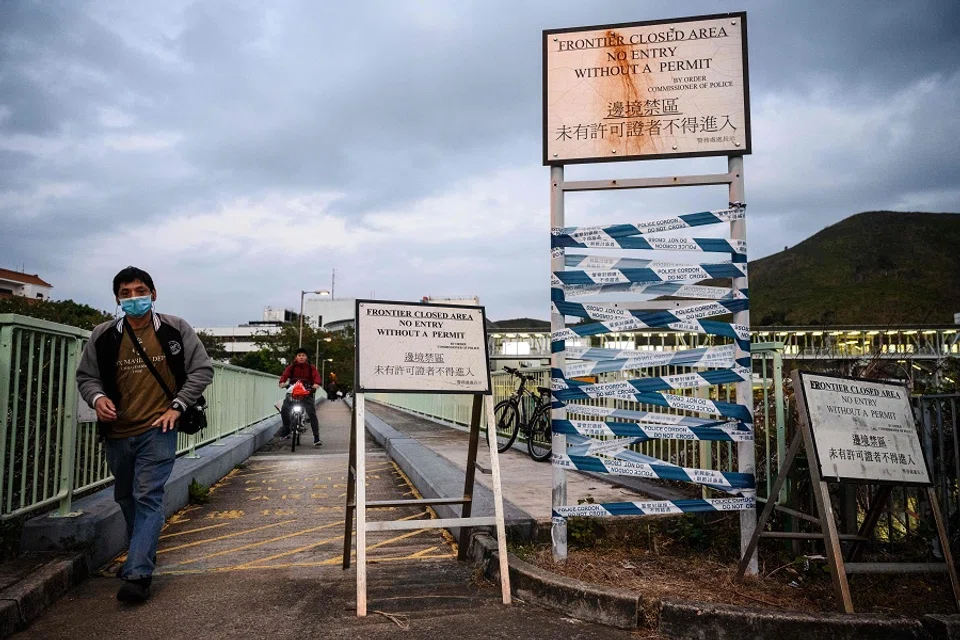Why can't Hong Kong implement a full border shutdown?
Lianhe Zaobao journalist Tai Hing Shing rationalises that Hong Kong's decision thus far not to completely close borders with the mainland is not unfounded.

The Covid-19 (formerly known as 2019-nCoV) outbreak continues to worsen in Hong Kong, with a sudden jump in confirmed cases to a total of 36 on 9 February 2020, increasing the possibility of a massive community outbreak. (NB: As of 11 Feb, Hong Kong's total tally of confirmed cases reached 49.) In the face of the worsening outbreak, many Hong Kongers have called for a "full border shutdown" with the mainland.
Frontline medical workers from public hospitals are at the forefront of this call, with members of the Hospital Authority Employees Alliance initiating a five-day strike that started last Monday (3 Feb). They did so in a bid to get the Hong Kong government to impose a travel ban on all mainland Chinese residents, thereby reducing the spread of the coronavirus.
Although the strike ended last Friday (7 Feb), the workers' demands have gained support from many Hong Kongers. A report from the Hong Kong Public Opinion Research Institute found that over 70% of respondents are dissatisfied with the HKSAR's handling of the outbreak, with approximately 80% in favour of a full border shutdown.

Despite immense public pressure, the Hong Kong government was unwilling to implement closure on all borders with the mainland. It only gradually heightened its preventive measures, including the closure of various ports. It was not until a death related to the Covid-19 was announced, that the authorities enforced a 14-day mandatory quarantine on all travellers from mainland China.
On the surface, it seems unfathomable that the Hong Kong government would still be unwilling to shut its borders at this critical point in time. After all, some countries and regions have already tightened their immigration rules and placed travel bans on travellers from China. Within the mainland's borders, many cities have also restricted the movement of its residents. Why can't Hong Kong shut all its borders then?
...tens of thousands of Hong Kongers travel between Hong Kong and the mainland on a daily basis for a variety of reasons. It would be irresponsible of the Hong Kong government to impose a complete closure on its ports and deny entry to them.
On deeper thought, however, the Hong Kong government has its reasons for not doing so. Demanding a ban on travellers from mainland China intentionally or unintentionally ignores the fact that Hong Kongers too are potential carriers of the virus. If only travellers from China are banned, and Hong Kongers (including carriers of the virus) are allowed to move freely, Hong Kong might quickly become the next Wuhan.
Some people counter that a full border closure is not only targeted at mainland Chinese, but all travellers attempting to enter Hong Kong from the mainland, which includes Hong Kongers. Yet, looking at the statistics, tens of thousands of Hong Kongers travel between Hong Kong and the mainland on a daily basis for a variety of reasons. It would be irresponsible of the Hong Kong government to impose a complete closure on its ports and deny entry to them.
Of course, there are also supporters of the ban who believe that one simply cannot consider too much in such critical times. A full border closure may not fully contain the outbreak, but at least it can achieve a certain effect. This belief is not wrong; the problem is, the impact of such a ban is too huge. It is paramount for the authorities to consider wider factors like the price society has to pay.

Currently, many countries and regions have already tightened its immigration rules and banned Chinese travellers from entering their territories. The US is one such example. It did not stop bringing problems to China just because the latter is battling against an epidemic. On the contrary, it was the first country to evacuate the US consulate in Wuhan, and also one of the first few countries to deny entry to travellers who have been to China in the last 14 days. From China's perspective, these actions were hostile.
Strictly speaking, the US is not taking advantage of China's crisis for personal gain. After all, the US and China are "unrelated" in every sense and no one will expect the US to give China unconditional assistance. Hong Kong is different - it has been a part of China since the beginning. It has the responsibility to consider the impact of a full border closure on the mainland.
Once Hong Kong implements a complete border shutdown, some countries will feel justified in telling Beijing, "Since your Hong Kong has already shut all borders, why can't we impose a total ban on Chinese travellers?"
One consideration would be the political ramifications of this decision. Recently, localist groups in Hong Kong (who are keen to preserve Hong Kong's identity and may have aims such as seeking greater autonomy for Hong Kong) have been making use of social anxiety to propagate the idea of a "full border shutdown" in a bid to create a "de facto separation" between Hong Kong and the mainland. Hong Kong has to be very careful of this.
Additionally, Hong Kong would be setting a bad example should it implement a full border shutdown. Last week, I was having a meal with a foreign diplomat in Hong Kong. He revealed that many countries often took reference from other countries and regions before implementing relevant travel advisories. Once Hong Kong implements a complete border shutdown, some countries will feel justified in telling Beijing, "Since your Hong Kong has already shut all borders, why can't we impose a total ban on Chinese travellers?" This impact is even greater than the previous one.
I'm suddenly reminded of what Alasdair Maclntyre, a Scottish philosopher whom academics call "a communitarianism giant", said about everyone having a past from the moment we are born: "As such, I inherit from the past of my family, my city, my tribe, my nation, a variety of debts, inheritances, rightful expectations and obligations. These constitute the given of my life, my moral starting point. This is in part what gives my life its own moral particularity."
According to Maclntyre, there's no unconditional power in life. All power comes with a certain degree of obligation. No one can be separated from society and traditions and thus, there is no true "individual" outside of society. This viewpoint is apt in describing the highly integrated relationship between China and Hong Kong.

Taking the Covid-19 outbreak for example, amid the widespread insufficiency of masks across different countries, China gave Hong Kong 17 million masks out of consideration that they are all Chinese people. In the same vein, since Hong Kong is a part of China and has enjoyed the aforementioned privilege, it is obligated to fulfil its responsibilities, including whether a full border shutdown is to be implemented or not.
Of course, humans are unable to predict the future and policies have to be adjusted according to the changing circumstances. Following the continued spread of the Covid-19, no one can guarantee that Hong Kong will not order a full border shutdown in the short term. At the present moment, it seems that the 14-day mandatory quarantine on all travellers from the mainland is the better choice.
Note:
Chief Executive Carrie Lam said yesterday (11 Feb) that only dozens of travellers from the mainland are entering Hong Kong on a daily basis over the past three days following the implementation of the 14-day mandatory quarantine. Human mobility across the borders has already been reduced to a minimum. If a full border shutdown were to be implemented, transportation companies and people who really need to return to Hong Kong will be the ones affected.



![[Photos] Fact versus fiction: The portrayal of WWII anti-Japanese martyrs in Taiwan](https://cassette.sphdigital.com.sg/image/thinkchina/3494f8bd481870f7c65b881fd21a3fd733f573f23232376e39c532a2c7593cbc)

